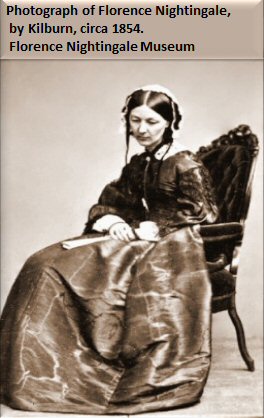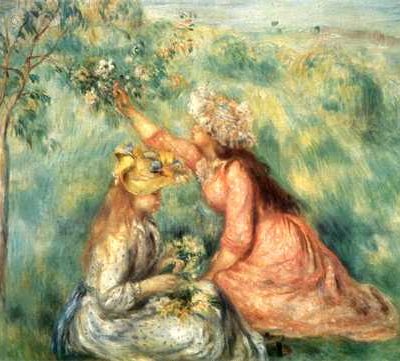Florence Nightingale “The Lady of the Lamp”

Florence Nightingale is one of my most favorite woman in history. She was the first woman nurse in Britain and served in the Crimean war. Florence changed the whole perception about women in the nursing profession. Her dedicated service to the wounded soldiers is why I admire her. It was not fashionable for women to be nurses at that time. She was a Christian women who taught the medical world how to better improve sanitary conditions for the patients. Florence Nightingale had passion and dedication to the profession of nursing and caring for the wounded soldiers she changed the perception about this much needed profession. She was called “the lady with the lamp.”
Florence was born in 1820 to English parents, Fanny and William. She had an older sister, Parthenope often called Parthe. She came from a wealthy and intelligent family. The girls were taught by their father. William Nightingale took on the responsibility of teaching his daughters Latin, Greek, German, Italian, French, English grammar, philosophy, and history. Florence and Parthe had a governess was taught them music and drawing. (Bostridge, 2008).
The girls were presented at court and introduced to society when Parthe was eighteen and Florence was sixteen. Their life then included many parties and much travel on the Continent. When she was seventeen, February 7, 1837, she felt that God spoke to her and called her into service. She deeply believed that she had a God-given purpose to better mankind, but the route to achieving this goal was unclear. (Calabria & Macrae, 1994; Cook, 1913). She did listen to that calling and her life was forever changed. (Christian History Magazine. 1990).
She spent all her spare time visiting the cottages on her family estate and bringing neighboring poor people food and medicine. Her family wanted Florence to marry and mingle in society. Florence had many marriage proposals which she declined because she did not feel like she was ready for marriage. Her family was horrified, hurt, angry, and shocked with her proposal to go to an infirmary run by a family friend. Florence was a gentlewoman of high society and at this time in history the hospitals were not a place for a lady. Hospitals were filthy, foul-smelling and nauseating. A head nurse of a London hospital told her that “in the course of her long experience she had never known a nurse who was not drunken, and there was immoral conduct in the very wards.” (Christian History Magazine. 1990). This did not matter to Florence she had a calling and she intended to follow her calling.
It was Florence Nightingale who transformed hospital procedures in England and really throughout the world. The president of the United States consulted Florence Nightingale, who wanted her advice about military hospitals during the Civil War. (Christian History Magazine. 1990)
During the Crimean War, she served in the first field hospital ever run and tended by women. She established schools for training nurses, and she introduced procedures that have been benefiting people ever since. (Christian History Magazine. 1990). Florence Nightingale continued following her calling in spite of her family urging for her to behavior as the lady she was. A woman of high social standing, being refined, dignified and well-mannered. Florence knew she had to care for others. Defying her parents she followed her passion for improving healthcare and providing nursing for those who need it. When she was seventeen she identified her Christian duty to serve mankind. When she was 25 she began to pursue her own goal and identified nursing as the means to fulfill this goal. (Gill, 2004).
Florence was offered the superintendence of a small hospital on Harley Street in central London in 1852. She was only there for a year but she developed the skills she needed to provide competent care and basic human rights for all people. (Verney, 1970).
Next Florence was appointed by the Victorian government to lead a group of thirty-eight women to Ottoman, Turkey, to provide nursing care for British soldiers fighting the Crimean War leaving the Harley Street position. This group of women witnessed filth, infection, disorganization, and an overwhelming case load. She dressed wounds, administered or supervised medical treatments, instructed nurses, and made rounds of the wards. Miss Nightingale had authority to requisition supplies, so she quickly asked for towels and soap and insisted that clothes be washed and floors scrubbed. Then, before she dropped exhausted into bed near midnight, she spent an hour or two writing reports for the government at home. (Bostridge, 2008).
Florence Nightingale read papers before societies on the subjects affecting the health and efficiency of hospital administration. She also published notes on hospitals, nursing, nursing for the laboring classes, observations on the sanitary state of the Army in India, how people may live and die in India, health teaching in towns and villages, as well as introductory notes on lying in institutions. (Jackson. 1908-1914. Pg. 173).
Returning from the Crimea, Florence worked tirelessly to develop nursing education that could be followed and help education the medical profession. She established the Nightingale School at St. Thomas’ Hospital London in 1860, and trained nurses. She followed her passion and was able to establish basis for nursing education worldwide. Florence Nightingale remained actively concerned with the development and behavior of the Nightingale nurses educated at the Nightingale School until her death in 1910 at age 90. (Godden, 2010).
She modestly avoided the national reception which was prepared in her honor and returned quietly to her home from the Crimean, but with health greatly affected by her experiences and labors. It was in recognition of her services £50,000 was raised by popular subscription, and with this she founded the Nightingale home for the training of nurses at St. Thomas’s and King’s College Hospitals. She continued to do work in the direction of reform of sanitary conditions in the army, anticipating in many respects the most recent prescriptions in respect to asepsis and antisepsis, especially emphasizing the duty of cleanliness. She was continually consulted on matters germane to the health of patients in hospitals and of inmates of institutions of various sorts, and led also in movements to improve the condition of the poor by better sanitation in their homes. (Jackson. 1908-1914. Pg. 173).
Florence lived on into old age, always supervising work at the Nightingale Fund School and always and everywhere being treated with a respect and awe. Edward VII bestowed on her the Order of Merit in 1907; it was the first time it had ever been given to a woman. She continued to write until her sight failed, her memory dulled, and she became a little vague. Then on August 13, 1910, she fell asleep around noon and did not awaken. Buried St. Margaret churchyard at Wellow, near Embley Park. (2 Christian History Magazine. 1990).
Florence Nightingale changed the whole perception about women in the nursing profession. Her dedication to service is to be admired. She changed the opinion about this much needed profession. This courageous woman climbed above the mountains of the social definitions of what the proper “lady’s role” in society was expected to be. She followed her passion and her calling from God and brought nursing into a respected profession for woman. She believed that the religious motive was essential for the highest and best kind of nurses. She brought the LORD into nursing and believed because there were so many different kinds of disappointments, sadness and experiences that sicken the heart. Being called into nursing to the works of the LORD is being one as a fellow worker with God. She was spiritually motivated, and unwavering in her beliefs, emphasizing devotion to a God of love and to the service of her fellow men.
The soldiers of Crimean adored her and christened her the “Lady of the Lamp,” after the Turkish lantern she carried on her midnight rounds. “The Lady of the Lamp”, was self-sacrificing in her labors of love. She had contracted a fever after the battle of Balaclava and stayed at her post, returning only when the British forces evacuated Turkey. Her motivation came from the LORD not from man. Whether on her feet or from her sickbed, Florence Nightingale worked to save lives. She is truly a woman of history that is revered, respected, and honored.
References:
Bostridge, Mark. (2008). Florence Nightingale: The woman and the legend. London: Penguin.
Calabria, M & Macrae, J. (Eds.). (1994). Suggestions for thought by Florence Nightingale: Selections and commentaries. Philadelphia: University of Pennsylvania Press.
Christian History Magazine. (1990). “A Forceful Faith,” Christian History Magazine-Issue 25: Dwight L. Moody: 19th c. Evangelist. Worcester, PA: Christian History Institute.
2 Christian History Magazine. (1990). “Events in the Life of Florence Nightingale,” Christian History Magazine-Issue 25: Dwight L. Moody: 19th c. Evangelist. Worcester, PA: Christian History Institute.
Gill, G. (2004). Nightingales: The extraordinary upbringing and curious life of Miss Florence Nightingale. New York: Ballantine Books.
Godden, J. (2010). The dream of nursing the empire. In S. Nelson & A.M. Rafferty (Eds). Notes on Nightingale: The influence and legacy of a nursing icon. London: ILR Press.
Jackson, Samuel Macauley ed. (1908-1914). The New Schaff-Herzog Encyclopedia of Religious Knowledge: Embracing Biblical, Historical, Doctrinal, and Practical Theology and Biblical, Theological, and Ecclesiastical Biography from the Earliest Times to the Present Day. New York; London: Funk & Wagnalls.
Verney, H. (1970). Florence Nightingale at Harley Street: Her reports to the Governors of her nursing home 1853-4. London: W.P. Griffith & Sons Ltd.
Cite Article Source
MLA Style Citation:
Holstein, Joanne “Florence Nightingale “The Lady of the Lamp”:.” Becker Bible Studies Library Nov 2015.<https://guidedbiblestudies.com/?p=2947,>.
APA Style Citation:
Holstein, Joanne (2015, November) “Florence Nightingale “The Lady of the Lamp”:.” Becker Bible Studies Library. Retrieved from https://guidedbiblestudies.com/?p=2947,.
Chicago Style Citation:
Holstein, Joanne (2015) “Florence Nightingale “The Lady of the Lamp”:.” Becker Bible Studies Library (November), https://guidedbiblestudies.com/?p=2947, (accessed).

